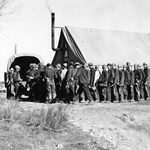 Japanese Americans who were interned at Camp Minidoka in Idaho will provide a look behind the barbed wire during a series of programs that will be presented at Linfield College and in McMinnville beginning Oct. 30.
Japanese Americans who were interned at Camp Minidoka in Idaho will provide a look behind the barbed wire during a series of programs that will be presented at Linfield College and in McMinnville beginning Oct. 30.
The Seeking Justice Project focuses on the events and aftermath of the forced internment of thousands of Japanese Americans during World War II. Many of the Japanese Americans who lived in the Northwest were forced to leave behind homes, businesses and property and were re-located to Camp Minidoka, an internment camp near Twin Falls, Idaho.
This series of programs will feature individuals who were interned, a program on the National Park Service’s action to make Camp Minidoka a National Historic Site, a theatrical drama focusing on the experiences of those interned, and a forum on immigration issues.
The program includes four presentations:
- “Behind Barbed Wire” will feature Yosh Nakagawa, Herb Tsuchiya and Lilly Kodama telling the stories of their experiences when they were interned at Camp Minidoka. Thursday, Oct. 30, 7 p.m., 201 Riley Hall, Linfield College.
- “Seeking Justice: Places of Conscience” will feature Carol Ash, chief of interpretation and education for the National Park Service at Camp Minidoka. She will discuss recent actions by the NPS to make Camp Minidoka a National Historic Site and additional government actions in an ongoing attempt to seek justice for the action of interning Japanese Americans during World War II. Monday, Nov. 3, 7 p.m., 201 Riley Hall, Linfield College.
- “Breaking the Silence,” written by Nikki Nojima Louis, is a readers theatre drama of Japanese immigration to the West Coast of the U.S., the challenges of immigrants and a new culture, the hysteria during World War II, with the internment of the Japanese Americans at the camps, and the legal struggle of the constitutional redress. Wednesday, Nov. 5, 7 p.m., Ice Auditorium, Melrose Hall, Linfield College.
- “Immigration Issues: Past and Present” is a forum featuring voices from the Japanese/Asian and Latino community. Yosh Nakagawa, Herb Tsuchiya, Miriam Corona and Julie Braker will discuss being viewed as an immigrant, and the challenges of fully participating in America, educationally, vocationally and legally. Friday, Nov. 7, 7 p.m., First Baptist Church, 125 Cowls St., McMinnville.
Many of those participating in the series of programs have ties to Camp Minidoka. Yosh Nakagawa, a member of the Linfield Board of Trustees from 1997-2001, was born and raised in Seattle, Wash., and sent to Camp Minidoka when he was 11. He went on to serve the Asian American Caucus and Ministries for the Evergreen Baptist Church and was vice president of American Baptist Churches USA. Herb Tsuchiya was 10 when his family was sent to Camp Minidoka and 13 when they were released. He went on to graduate from the University of Washington School of Pharmacy and was a pharmacist in Seattle for more than 50 years. He is also has been a cast member of “Breaking the Silence” for 20 years. Lilly Kodama was 7 when she and family were taken from Bainbridge Island, Wash., to the internment camps.
The programs are free and open to the public and sponsored by the Frazee Lecture in Bible and Religion, and PLACE (Program for the Liberal Arts and Civic Engagement). The Frazee Lecture was established by friends and family in honor of Gordon G. Frazee, who served Linfield for 32 years as chaplain and professor of religion. The fund is designed to encourage the exchange of ideas across disciplines, promote civic engagement and pique intellectual curiosity through the exploration of thematic connections. This year’s PLACE theme explores the question “How Do We Know?” Additional sponsors of the Seeking Justice Project are the McMinnville First Baptist Church and Interfaith Advocates for Peace with Justice. For more information, contact Bill Millar, professor of religion, 503-883-2456.

